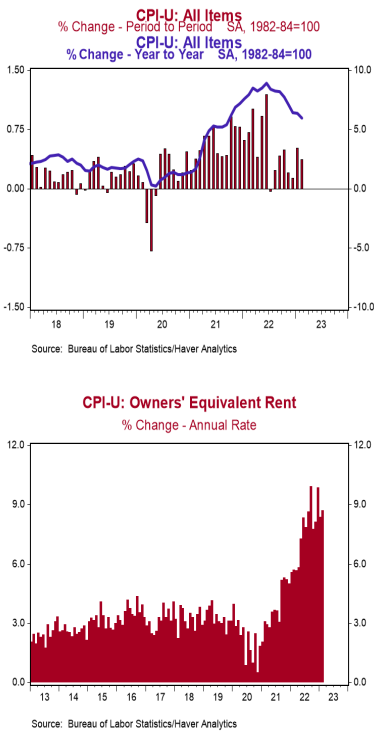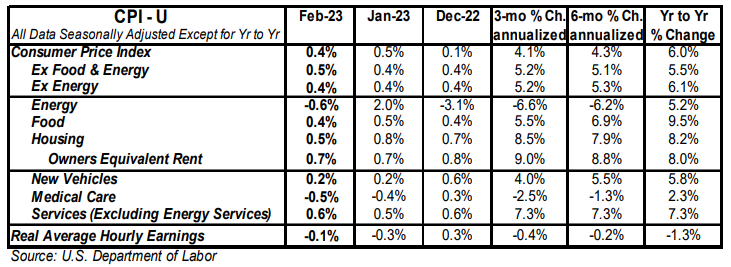- The Consumer Price Index (CPI) rose 0.4% in February, matching consensus expectations. The CPI is up 6.0% from a year ago.
- Food prices increased 0.4% in February, while energy prices declined 0.6%. The “core” CPI, which excludes food and energy, rose 0.5% in February, above the consensus expected +0.4%. Core prices are up 5.5% versus a year ago.
- Real average hourly earnings – the cash earnings of all workers, adjusted for inflation – declined 0.1% in February and are down 1.3% in the past year. Real average weekly earnings are down 1.9% in the past year.
Implications:
Given recent turmoil in the banking system, the Federal Reserve is likely to only raise short-term interest rates by a quarter percentage point next week, or maybe not raise rates at all. But inflation is still a major problem and needs to be addressed. Consumer prices rose 0.4% in February while “core” prices, which strip out the often volatile food and energy categories, rose 0.5%. Overall prices are up 6.0% from a year ago while core prices are up 5.5%; both well above the Fed’s 2.0% inflation target. The main driver for higher prices in February were housing rents, which rose 0.7% for the month and accounted for more than half of the overall increase. Rents for both actual tenants and the imputed rental value of owner-occupied homes are running at or above an 8% annualized rate over three, six, and twelve month timeframes. This is important because together they make up a third of the weighting in the overall index. We expect rents to continue to generate high inflation for some time as they catch up to home prices, which skyrocketed in 2020-21. Meanwhile, a subset category of inflation, dubbed the “Super Core” and which the Fed watches closely, showed no sign of slowing in February, rising 0.5% for the month. This measure, which excludes food, energy, other goods, and housing rents, is up at a 5.0% annualized pace in the last three and six month periods. It’s important to recognize that overall prices continue to rise despite improvements in categories that were labeled “transitory” and were consistent tailwinds to inflation during the pandemic. For example, used cars and trucks fell 2.8% in February, extending its streak to eight consecutive monthly declines. Medical care services (-0.7% in February) continue to decline, as well, after consistently rising for most of 2021-22. Put it all together, and Powell and the Fed have plenty of reasons to keep raising rates and tighten monetary policy in the months to come, in spite of news about Silicon Valley Bank, Signature, and First Republic. But what the Fed should do and what they will do can unfortunately differ. The Fed’s resolve is about to face a serious test.





